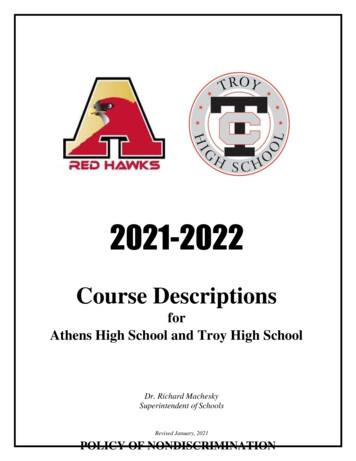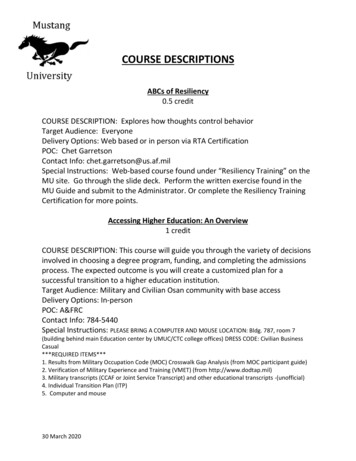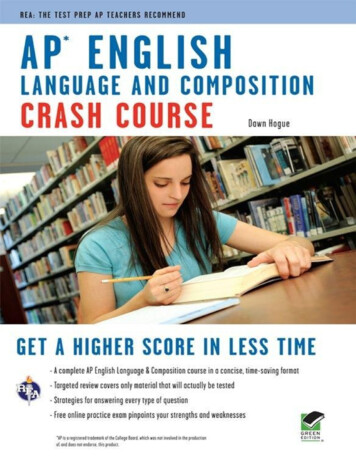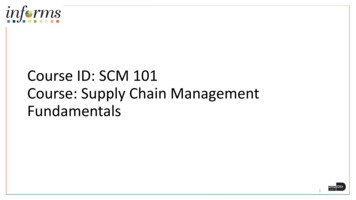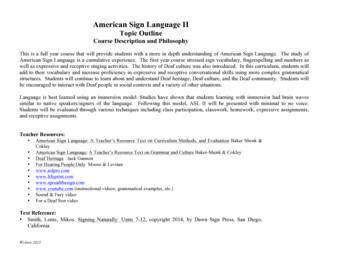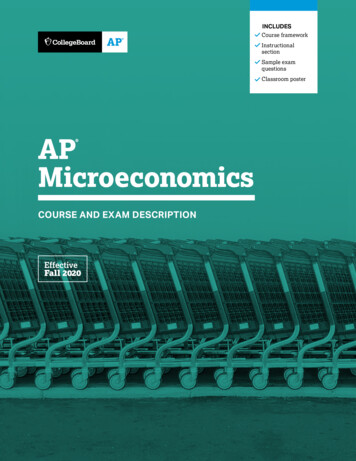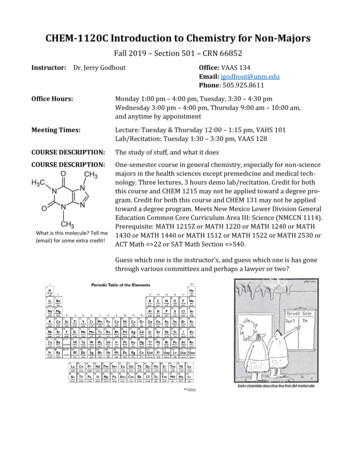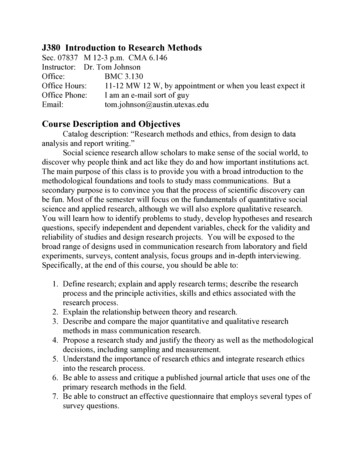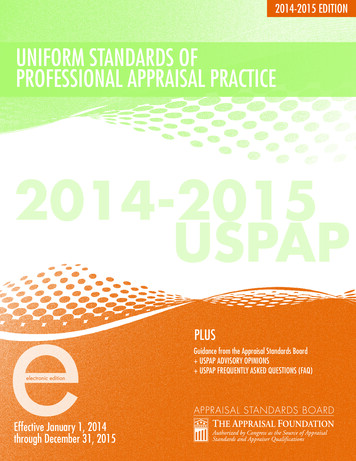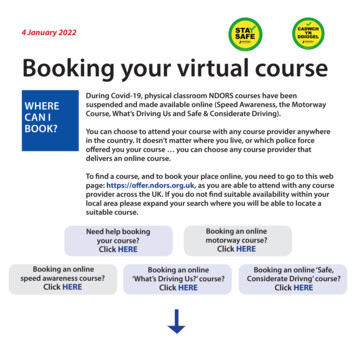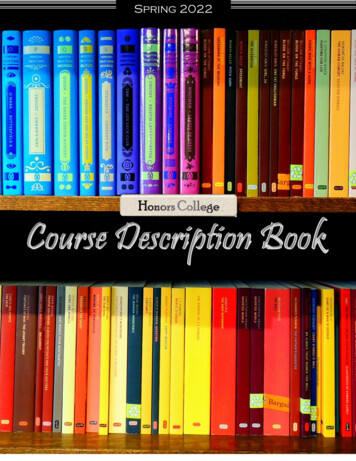
Transcription
Spring 2022Course Description Book
Priority RegistrationHonors students receive priority registration privileges by being assigned an early registration time.You are granted this benefit to help ensure that you obtain the schedule necessary to complete yourHonors requirements along with those in your major. Here is the procedure for PAWS registration:1. Spring 2022 registration appointment times will be available November 6th and can be foundin PAWS on the right side of the Student Center page. Be sure to check your PAWS account atthis date to clear any holds on your account. Holds will prevent you from registering!2. Registration for Spring 2022 will begin on Monday, November 15th. Please review yourregistration assignment in PAWS and confirm that your enrollment date has been sent for11/15. Please take advantage of priority registration by enrolling at your assigned date andtime.3. There are no waitlists for Honors 199 or 200. If you are attempting to enroll in Honors 199 or200 and it is full, please select another section. If you are registering for an upper-levelcourse, be sure to check the “add to waitlist” box when putting the course in your shoppingcart.4. Please ONLY register for two courses if you are planning to take two courses! Please beconsiderate of your classmates who are also trying to register for courses. Any studentenrolled in more than two Honors courses will be administratively dropped from theadditional course(s) at the discretion of the Associate Director.5. Clarification: Nursing 380 satisfies part of the UWM GER Social Science requirement only fornon-L&S students. It does not satisfy any part of the L&S 12 credit Social Sciencedistribution/breadth requirement and does not count toward the 90 L&S credits needed forgraduation with an L&S degree. It does, however, count as 3 credits of electives toward the120 credits needed to graduate with an L&S degree.Need help on Mon, Nov 15th - Priority Registration Morning?The Honors staff will be readily available in the following ways: Visit us in the Honors House Office – HON 154.Call us at 414-229-4658.Contact us on Teams between 8am and 10am in one of the followingways:oo Video chat with us by using the link we sent you via emailCall us at 414-253-8850 and enter the Conference ID: 633102833#Email us at honors@uwm.edu and we will have an advisor get back toyou as soon as possible.
Honors College Courses Spring 2022To satisfy graduation requirements in the Honors College, you must complete 21 credits in courses approved forHonors credit, including: Honors 200 (3-6 credits), Upper-level seminars (minimum of 9 credits) and other nonseminar or Honors experiences (up to 9 credits). Honors Courses cannot be audited or taken with the credit/no credit option. Students must earn at least a B- in an Honors course to earn Honors credit. All upper-level seminars require sophomore standing or consent of the Honors College Director. All upper-level seminars are retakeable with change in topic to 9 credits max other than HON 380. HON380 is retakeable ONCE with change in topic.Honors199U 1HHonors Independent StudyAdmission to Honors College or consent by director. Not open to University Special Students.SEM 00146897R3:30-4:45pmDaigleHonors College Research & WritingStudents should be concurrently enrolled in English 102 and Honors 199. Students earning a B- or better inHON 199 and C or better in English 102 will receive 4 credits toward their Honors Degree.Honors200(HU,OWCB)Math222(NS)HONORS350(HU)U 3HHonors Seminar: The Shaping of the Modern MindCons Honors College Director. Not open to students with credit in Honors courses 300-level & above.Retakeable once with a change in topicSEM 00149443MW9:30-10:45amSingerBandits!SEM 00249444MW11am-12:15pmMarksJourneys to Hell and the Dark SublimeSEM 00349445MW12:30-1:45pmSingerBandits!SEM 20445150MW2:00-3:15pmStuhmillerEncounters with the WildernessSEM 00545151MW3:30-4:45pmSouthwardPoetry and EmpathySEM 20649446M5:00-6:15pmBarthHow to Survive the ApocalypseSEM 00745153TR9:30-10:45amSnowWhat is Art?SEM 00845154TR9:30-10:45amSchneiderDirty Realism and the Other AmericaSEM 00945155TR11am-12:15pmSnowWhat is Art?SEM 01045156TR12:30-1:45pmSchneiderDirty Realism and the Other AmericaSEM 21145016TR2:00-3:15pmStuhmillerEncounters with the WildernessSEM 01245158TR3:30-4:45pmSouthwardPoetry and EmpathyU 5HHonors Calculus IIMaximum of 6 cr. in combination of Math 221 & 222 may count toward Honors Collegerequirements.SEM 00143673 MTWR 2:00-3:15 PMFraneckiHonors Calculus IIU 3HHonors Seminar in the HumanitiesSoph st & cons Honors College Director. Retakable w/change in topic to 9H cr max.SEM 001SEM 002SEM 203SEM 004SEM StuhmillerLipinskiBrusinSacred Asia (*)Dark NarrativesThe Symbolic AnimalInfo, Law, & Policy in the Information SocietyJoseph: A Biblical Psychological Thriller
HONORS U 3HHonors Seminar in the Social Sciences351Soph st & cons Honors College Director. Retakable w/change in topic to 9H cr max.(SS)SEM 001 46874TR2:00-3:15pmBudnyJudging Politics: U.S. Constitutional Law and Moot CourtHONORS U 3HHonors Seminar in the Natural Sciences352Soph st & cons Honors College Director. Retakable w/change in topic to 9H cr max.(NS)SEM 001 48248TR2:00-3:15pmFreireProject NeandertalSEM 002 48429TR3:30-4:45pmFreireProject NeandertalHONORS U 3HHonors Seminar in the Arts380Soph st & cons Honors College Director. RETAKABLE ONCE w/chg in topic to 6H cr max.(A)SEM 001 43343MW 12:30-1:45pmDaigleThe Art of Truth/Truth of ArtSEM 002 44885MW 3:30-4:45pmDaigleThe Art of Truth/Truth of ArtSEM 003 44886TR11am-12:15pm SandsSlow Writing: Slow LookingSEM 004 46872TR12:30-1:45pmSouthward Radical Beauty: Pre-Raphaelite Art and DesignHONORS U 3HAd Hoc499Soph st & cons Honors College Director. RETAKABLE ONCE w/chg in topic to 6H cr max.SEM 001 49447MW 3:30-4:45pmThompson Thinking Like an Entrepreneur ( )GEOG381(SS)U 3HHonors SeminarSoph st & cons Honors College Director. Retakable w/change in topic to 9H cr max.The Story of Bharat/India: Origins, Philosophies,SEM 201 49475TR3:30-4:45pmGhoseCulturesHIST398(HU)U 3HHonors SeminarSoph st & cons Honors College Director. Retakable w/change in topic to 9H cr max.SEM 001 49511MW 11am-12:15pm Shumway Gold and Vibranium, Myth and Reality in African HistoryHIST399(SS)U 3HHonors SeminarSoph st & cons Honors College Director. Retakable w/change in topic to 9H cr max.SEM 001 44834MW 2:00-3:15pmHaighHow the Computer Became Universal NEW TOPICSEM 002 49512TR9:30-10:45amSingerThe Age of RevolutionNURS380(SS)U 3HHonors SeminarSoph st & cons Honors College Director. Retakable w/change in topic to 9H cr. Max.Failed System? Explo of America’s Health & HealthcareSEM 00143826 TR3:30-4:45pmEricksonSystem (†)WGS380(SS)U 3HHonors SeminarSoph st & cons Honors College Director. Retakable w/change in topic to 9H cr. Max.SEM 00149257 MW 9:30-10:45amFavaraGender, Media, and Militarization(*) Credits for this course topic count toward the College of Letters and Science International Requirement.(†) Nursing 380 satisfies part of the UWM GER Social Science requirement only for non-L&S students. It doesnot satisfy any part of the L&S 12 credit Social Science distribution.Courses in blue are planning to meet completely online. Courses in yellow are hybrid (in-person andonline sync or async). Please see course description for additional information.
Non-Seminar OptionsThere are several ways Honors College students can complete up to 9 Honors credits outside of theclassroom. These experiences help students customize their educational experience under the guidanceof some of the best faculty members on campus. Non-seminar options include:Honors Non-Seminar OptionsHON 6851-6HHON 6863-6HHON 6873-6HHON 6893-6HHonors Tutorial: Jr. Standing. Retakeable to a max of 6H credits. Written consentrequired by the Honors College BEFORE registering for this course.Research in Honors: Jr. Standing & 9 credits in Honors. Retakeable to a max of 6credits. Written consent required by the Honors College BEFORE registering for thiscourse.Senior Honors Project: Sr. Standing. Not open to students in HON 689. Writtenconsent required by the Honors College BEFORE registering for this course.Senior Honors Thesis: Sr. Standing. Retakeable to a max of 6 credits. Writtenconsent required by the Honors College BEFORE registering for this course.Open to seniors only:Senior Thesis (Honors 689): An extended paper(typically 50-75 pages) written over two semestersreflecting independent research conducted in someaspect of a student’s major/field of study under thesupervision of a faculty advisor.Open to juniors and seniors:Research in Honors (Honors 686): Assist a facultymember with current research or design and completean original experiment or data-analysis under thesupervisor of a faculty advisor. Research may beconducted over one or two semesters.Senior Project (Honors 687): A work of art, music,technology or design created over one or twosemesters and done under faculty supervision andrepresenting a superior level of accomplishment.Honors Tutorial/Independent Study: A selfdesigned course of reading and writing taken overone semester. Students may register for this under adepartmental independent study or under Honors 685.Alternative Honors Credit Proposal: Many majorsrequire a final capstone or project. With permissionfrom both the degree-granting college and HonorsCollege Director, students may add an honorscomponent to this final capstone or project alreadybuilt into their curriculum.Open to all students:Study Abroad: Earn credit for courses taken abroad.Students may earn 3 credits per term through studyabroad and must complete both a pre- and post-studyabroad appointment with an advisor.Graduate Course: Students may count coursescompleted for graduate credit as non-seminar towardtheir Honors College Degree. Permission must beobtained from the instructor, department chair ordesignee of the appropriate school/college, andHonors College Director.* Read more about the non-seminar riculum/non-seminar-options/
HONORS 199: HONORS COLLEGE RESEARCH & WRITINGIndependent StudyLindsay Daigle, Honors College LecturerSem 001, Class #46897: TR 3:30 p.m. – 4:45 p.m.This course meets on the following dates: 1/27, 2/3, 2/17, 3/3, 3/17, 4/7, 4/21, 5/5Reading/Viewing Texts that complement English 102 texts (provided in class)Student-generated textsCourse DescriptionHonors students concurrently enrolled in English 102 are eligible for this 1-credit collaborativeindependent study course. Honors 199 complements English 102 with orientation to Honors courseworkand expectations in a writing-intensive setting. Students are fully part of the Honors College as theyprepare for Honors 200 and upper-level Honors courses. Although it is labeled an “independent study,”this course values community and collaboration as central goals.Honors 199 will meet eight times throughout the semester. During these meetings, students drawon their English 102 learning and research experiences in both collaborative and individual activitiesresponding to contemporary academic conversations. Coursework includes discussions, writing, andcreative exercises in critical thinking and inquiry foundational to academic writing and UWM’s Honorscurriculum. Through these activities, students become more oriented to the Honors community, oneanother, and themselves.Students who earn a B- or better in Honors 199 and a C or better in English 102 receive 4 creditstoward their 21-credit Honors requirements. All credits earned in both classes count toward UWMgraduation and GPA calculations, whether or not Honors credit is earned. Students may enroll in anysection of Honors 199 and any section of English 102, but must enroll in both concurrently.Course Requirements Class Engagement (60%): This refers to presence which can take many forms. It can include but isnot limited to: full participation in writing and creative exercises, discussions, and other activities,as well as arriving on time, posing relevant questions/concerns, commenting thoughtfully, andbeing equipped with relevant daily texts/materials during class meetings. Students will have anopportunity to self-assess their engagement levels in order to contribute to the grading process.Honors College Engagement Group Project (25%): In groups of 3-4, students will collaborate on adetailed plan to A) establish a new club/organization/activity through the Honors College, B)propose an engaging activity for an existing Honors club/organization to host, or C) implementmeaningful changes to an existing Honors club/organization/activity. This is an opportunity forstudents to reflect on, research for, and create real changes within their communities.Honors Event/Club Engagement (15%): This includes attendance of and written account for 2Honors-hosted events or club meetings.
HONORS 200: THE SHAPING OF THE MODERN MIND (HU)Bandits!Alan Singer, Honors College Senior LecturerSem 001, Class #49443: MW 9:30 a.m. – 10:45 a.m.Sem 003, Class #49445: MW 12:30 p.m. – 1:45 p.m.ReadingBooks:Marcus Rediker, Villains of all Nations: Atlantic Pirates in the Golden AgeChris Frazer, Bandit Nation: A History of Outlaws and Cultural Struggle in Mexico, 1810-1920William A. Settle, Jr., Jesse James Was His NameExcerpts and Articles:Eric Hobsbawm, “What is Social Banditry”R.H. Hilton, “The Origins of Robin Hood”ViewingBonnie and Clyde dir. Arthur Penn (1967)The Assassination of Jessie James by the Coward Robert Ford dir. Andrew Dominick (2007)Course DescriptionWhy are some thieves, murderers, extortionists, and other outlaws remembered and widelycelebrated? In virtually all religious and ethical traditions, people are supposed to treat each other fairlyand live peacefully, yet these transgressors are often considered heroes and have qualities that manypeople admire. These sections of Honors 200 examine this paradox. We will primarily focus on whathistorians, sociologists, and folklorists call “social banditry”—a phenomenon which occurs whenmembers of the public view certain outlaws as avengers, fighters for justice, and liberators. We willstudy some of the most popular examples of social banditry in the Anglo-American world from the lateMiddle Ages through the 20th century. Class discussions will consider the following questions: Arethere ideal types of social and economic conditions which make banditry more favorable? If so, whatare they? How does our historical memory of bandits change over time and context? What types ofsocial banditry are notable today and what social conditions help produce them?Course Requirements*Three 5–7-page papers 20% each*Two short essays 10% each*Class participation worth 20%
HONORS 200: THE SHAPING OF THE MODERN MIND (HU)Journeys to Hell and the Dark SublimeBrian Marks, Honors College Senior LecturerSem 002, Class #49444: MW 11:00 a.m. – 12:15 p.m.ReadingThe Inferno of Dante. Trans. Robert Pinsky.Cormac McCarthy’s The Road.Course Reader—Including readings from Nathaniel Hawthorne, William Blake,Victoria Nelson, Margot Adler, Maya Duren, Aguire-Sacassa, ShirleyJackson, Angela Carter, Neil Gaiman, Richard Cavendish, Aleister Crowley, and otherauthors as well as tip sheets and sample writing.ViewingBladerunner, Pan’s Labyrinth, and No Country for Old MenCourse DescriptionWhere is hell? Who goes to hell? Do unbaptized babies go to hell? Do we still believe in a place forthe eternal punishment of wicked souls? Why does Satan have horns and a tail? Why does evil so often appearin the form of snakes? What role does hell play in serving heaven? Is hell just a Christian idea? What is itabout hell that we find so repelling and fascinating?In this course, we will attempt to answer those questions and other questions about hell and try tounderstand the draw to the dark sublime. We are going to go back and forth between today’s culture and thoseof the past as we consider the purpose and state of hell and why humans are drawn to confrontations with thedark sublime. For Romantic poets like William Blake, the sublime was the most powerful of emotions, onethat merged beauty and terror. The class material will mainly be literary based, but we will also check outrepresentations of hell and the confrontations with the dark sublime in art, graphic novels, film, and music.From time to time, we will read directly from religious texts. However, those religious texts will not be ourfocus as we investigate this subject matter. Reason one, I am not a theologian; my expertise is in literature.Reason two, most of our present-day depictions of hell and the dark sublime come from literature and art, notfrom religious texts. Surprisingly, only a little bit is said in the Bible, the Koran, and other religious textsabout hell.The class theme will be dark, but the internal light of knowledge will shine to help us see our waythrough. Serious people know how to joke, and so will we. You should expect to write about the dark sublimeand ways in which invisible influences the visible life in profound ways.Course Requirements Course engagement and professionalism 30%Four response papers—Semi-formal writing to prepare for class discussions (1-2 pageseach) 20%Revised final term paper on a relevant topic of your choice (6-8 pages) 50%
HONORS 200: THE SHAPING OF THE MODERN MIND (HU, OWCB)Encounters with the WildernessJacqueline Stuhmiller, Honors College LecturerSem 204, Class #45150: MW 2:00 p.m. – 3:15 p.m. ONLINESem 211, Class #45016: TR 2:00 p.m. – 3:15 p.m. ONLINEReadingCourse ReaderHenry David Thoreau, Walden; or, Life in the WoodsJames Dickey, DeliveranceViewingWerner Herzog, Grizzly ManSean Penn, Into the WildCourse DescriptionThe wilderness is not a place but an idea. In myth, literature, art, and history, the wilderness is apowerful symbol, and often a contradictory one. It is sometimes a place of liberation, inspiration, andsalvation; at other times, it is a place of psychological, physical, or spiritual torment. It tests us invarious ways, and not everyone passes its tests. It is a place of confusion as well as epiphany, sin aswell as cleansing, ugliness as well as beauty. A journey into the wilderness is always significant – itmay symbolize the journey through life, a young person’s journey into adulthood, or the journey fromignorance to wisdom. We all must enter the wilderness in one way or another, and no one leavesunchanged; some of us do not leave at all.In this course, we will study a wide range of texts and films in order to explore the ways thatpeople have used the wilderness to represent and understand the human condition. Students will havethe opportunity for self-analytical and creative work as well as more traditional literary and cinematicanalysis.Please note that this is neither a science nor an outdoor education class.Course Requirements15% of the final grade will be based on two short formal papers. 40% of the final grade will bebased on short, frequent informal writing assignments. 20% of the final grade will be based on asubstantial final project. 25% of the final grade will be based on what I call “presence”: attendance,preparedness, attention, and interest.
HONORS 200: THE SHAPING OF THE MODERN MIND (HU)Poetry and EmpathyDavid Southward, Honors College Senior LecturerSem 005, Class #45151 MW 3:30 p.m. – 4:45 p.m.Sem 012, Class #45158 TR 3:30 p.m. – 4:45 p.m.ReadingRichard Blanco, Looking for the Gulf Motel [978-0822962014]torrin a. greathouse, Wound from the Mouth of a Wound [978-1571315274]Marie Howe, What the Living Do [978-0393318869]Amit Majmudar, Dothead [ISBN: 978-1101947074]Nate Marshall, Finna [ISBN: 978-0593132456]Natasha Trethewey, Monument [978-0358118237]Course DescriptionCan reading poems make us more empathic? Can it help us step into the shoes of a stranger,walk through their inner world, and see reality from their point of view? With its highly personalizedlanguage, does poetry offer a unique glimpse into the imaginative lives of others—and potentially theability to feel life as they do?In this course we will read and examine collections by a diverse group of contemporary poets.As we work our way through them, we will explore: the differing ways that poets experience their worlds, both social and private; how these experiences are shaped and given meaning by language; how individual poems in combination suggest a poet’s worldview; how these worldviews overlap, intersect, or collide with our own; what role poetry plays (or ought to play) in the development of empathy among readersand citizens in a democracy.Along the way, students will also grow increasingly comfortable with formal aspects of poetry(rhythm, line, stanza, metaphor, etc.) that might have intimidated them in the past. No priorbackground in poetry is needed for this course – just a willingness to dive into musical language and todiscuss how it makes you feel or think.Course RequirementsStudents will keep an “empathy journal” for the semester, providing material for weeklyDiscussion posts (10% of final grade) as well as a final reflective essay (20%). Two short papers—areaction study and a profile of one poet—will be submitted and revised in response to feedback byclassmates and the instructor (20% each). Each student will write a poem in the style of a chosen poet,along with a short reflection on the experience (15%). Everyone is expected to participate actively indiscussion; to prepare for class by reading closely and posting journal entries on Canvas; to leaddiscussions of poems of their choosing; and to critique four papers by classmates (15%).
HONORS 200: THE SHAPING OF THE MODERN MIND (HU, OWCB)How to Survive the ApocalypseDylan Barth, Honors College LecturerSem 206, Class #49446: M 5:00 p.m. – 6:15 p.m., ONLINE SYNC & ASYNCReadingBrin, David, The Postman [979-8657514285]Butler, Octavia E., Parable of the Sower [978-1538732182]McCarthy, Cormac, The Road [978-0307387899]Emily St. John Mandel, Station Eleven [978-0804172448]FilmsGeorge Miller, Mad Max: Fury RoadCourse DescriptionWhy does the popularity of post-apocalyptic fiction endure? How has this science fiction subgenre evolved over the last seventy years? What does the end of the world tell us about ourselves? Inthis course, we will address these questions and more by reading novels that imagine the end of theworld as we know it. The word apocalypse comes from the ancient Greek meaning “to reveal,” soconsidering this context, we will focus on what post-apocalyptic novels attempt “to reveal” aboutAmerican culture. As part of this exploration, we will consider how characters who survive apocalypticevents—caused by disease and nuclear war—are represented by focusing on identities of race,ethnicity, class, and gender. We will also consider the thematic moralizing that is common to postapocalyptic fiction within the various novels’ historical and cultural contexts. In addition, we willdiscuss several short articles about cultural theory that will help situate our discussions of the novels,and we will extend our examination of the post-apocalypse to other mediums within the genre,including film, TV, and graphic novels. You do not need to have any background in reading or writingabout literature or post-apocalyptic texts to succeed in this course.Course RequirementsStudents in the course will complete 6-8 short writing assignments (20%) and will write andrevise two interpretive essays (40%) that focus on the primary readings of the course. Students willalso participate in online, asynchronous discussions in Canvas (20%), perform a 10-minute virtualpresentation (10%), and complete activities during synchronous online sessions (10%).Note that this class will meet synchronously online on Mondays, other course material will beavailable on Canvas in an asynchronous format.
HONORS 200: THE SHAPING OF THE MODERN MIND (HU, OWCB)What is Art?Hilary K. Snow, Honors College LecturerSem 007, Class #45153: TR 9:30 a.m. – 10:45 a.m.Sem 009, Class #45155: TR 11:00 a.m. – 12:15 p.m.Readings available on Canvas including:Marcel Duchamp. “The Creative Act.”Carol Duncan. “The Art Museum as Ritual.”Linda Nochlin, “Why Have There Been No Great Women Artists?”Heinrich Wölfflin. “Principles of Art History.”Other materialsStudents should expect to visit the Milwaukee Art Museum at least once on their own and paythe 17 admission fee.Course DescriptionAt once simple and complicated, “art” can be defined in many ways. What makes the work ofone person celebrated while others are forgotten? How do artists, art historians and the public approachworks of art? This course interrogates the idea of “art” across history and cultures, focusing on whatWestern art history has defined as masterpieces of “art” and what ideas get left out from thatperspective. We will examine important movements in art and art history, including feministapproaches, the rise of abstraction, and how art can be used to understand history. We will consider artnot only as an aesthetic activity, but also as a part of social movements and political ideas. We willalso discuss museum displays and how public presentations can affect our understandings. PendingCovid restrictions, this course will include field trips to local museums accessible by bus.Course RequirementsParticipation, including regular attendance, evidence of careful class preparation, active andproductive contributions to class discussions, short assignments throughout the semester, thoughtfulresponses to readings and peer critiques, and respectful engagement with peers: 30%.Formal analysis of a work of art (must be rewritten): 15%Artist biography: 15%Paper about a work of art, 5-7 pages (optional rewriting): 20%Discussion leading and presentation: 10%Critical reflection journal: 10%
HONORS 200: THE SHAPING OF THE MODERN MIND (HU, OWCB)Dirty Realism and the Other AmericaBenjamin Schneider, Honors College Senior LecturerSec 008, Class #45154: TR 9:30 a.m. – 10:45 a.m.Sec 010, Class #45156: TR 12:30 p.m. – 1:45 p.m.Reading (selections)Lucia Berlin, A Manual for Cleaning Women (2015)Raymond Carver, What We Talk About When We Talk About Love (1981)Denis Johnson, Jesus’ Son (1992)Maurice Carlos Ruffin, The Ones Who Don’t Say They Love You (2021)Screening (subject to change)Lance Hammer, Ballast (2008)Sean Baker, The Florida Project (2027)Liza Johnson, Return (2011)Course DescriptionIn 1983, Bill Buford, editor of literary magazine Granta, wrote that "Dirty realism is the fictionof a new generation of American authors. They write about the belly-side of contemporary life – adeserted husband, an unwed mother, a car thief, a pickpocket, a drug addict – but they write about itwith a disturbing detachment, at times verging on comedy. Understated, ironic, sometimes savage, butinsistently compassionate, these stories constitute a new voice in fiction.” While the “new voice” is nolonger new, this brand of realism remains able to give voice to people and places that are oftenoverlooked in the fiction and film of contemporary culture. Also called “Kmart Realism,” the genreand its artists continue to reveal much about US culture and its people.In this course, we will study these short stories and films closely to see how and if they speak toour contemporary moment. We’ll ask about character, narrative, theme, setting, form, point-of-view,mise-en-scene, sound, and more to see what other questions derive from these close examinations. Forexample, do the people described in these narratives “count” in contemporary US culture? Do theartists’ points-of-view register as inclusive? What do we learn about ourselves and our culture fromengaging these fictions? Are there other cultural forms that depict similar narratives? Why do theseartists choose the subjects they choose? Why would Buford call this genre “dirty”? We will spend ourclassroom time discussing these works and these questions from various angles. Note: Some of thecourse content may be upsetting.Course Requirements Daily attendance, punctuality, and active participation 25%Three 4-5 page essays, two of which may be revised 75%
MATHEMATICAL SCIENCES 222 (NS)Honors Calculus IIJoseph Franecki, Ph.D., Senior Lecturer of MathematicsSem 001, Class #43673: MTWR 2:00 p.m. – 3:15 p.m.(Prerequisite: Grade of C or better in Math 221)ReadingRequired*: Calculus Single and Multivariable, 8th edition, by Hughes-Hallet, et al. The ISBNfor the book is: 978-1-119-69655-1. Students may also wish to purchase a Student Solutions Manual.Additional handouts may also be made available during the semester (at no charge).Course DescriptionThe world in which we live today could not exist without the explosion in mathematicalknowledge which has occurred since the Renaissance. Not only does mathematics make moderntechnology possible, but mathematical ideas have profoundly changed our views of the structure of theworld itself. The ideas which today are grouped under the heading of Calculus lie at the center of thistransformation; although some of them can be traced back to Archimedes, the subject is usuallyconsidered to have been developed by Newton and Leibniz in the seventeenth century, and its successin solving problems such as planetary motion led to the modern idea of the universe as a complex, butpredictable, machine.In the two semesters of this sequence of courses, we will cover material equivalent to thestandard three-semester calculus sequence (Math 231, 232, 233), but our goal is to gain a richerunderstanding of the material, both the underlying notions and their use in the context of solving realworld problems. A sound knowledge of algebra and trigonometry is required for the course.The key concepts we will cover in the second semester are:1. Sequences and Series.2. Vectors and Vector functions.3. Functions of several variables, parti
SEM 004 46872 Radical Beauty: PreTR 12:30-1:45pm Southward -Raphaelite Art and Design HONORS U 3H Ad Hoc 499 Soph st & cons Honors College Director. RETAKABLE ONCE w/chg in topic to 6H cr max. SEM 001 49447 MW 3:30-4:45pm Thompson T
